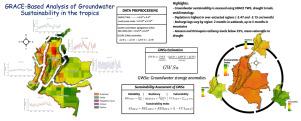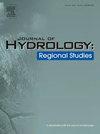GRACE-based analysis of groundwater sustainability in the tropics
IF 5
2区 地球科学
Q1 WATER RESOURCES
引用次数: 0
Abstract
Study focus
This study uses satellite observations from the Gravity Recovery and Climate Experiment (GRACE) and the Global Land Data Assimilation System (GLDAS) to evaluate groundwater storage sustainability across Colombia. The assessment integrates drought climatology estimates, basin-scale trends, and sustainability indices, providing essential information to support long-term groundwater management strategies and strengthen climate resilience.
Study region
Colombia lies in the equatorial tropics, where the hydrological regime is shaped by the complex orography of the three ranges of the Colombian Andes. This study evaluates groundwater sustainability across the five major Colombian river basins from 2003 to 2024. The findings provide a basin-level perspective on groundwater dynamics, offering insights to guide sustainable water resource management in tropical Andean regions.
New hydrological insights for the region
Groundwater sustainability is at risk in numerous regions worldwide, where overexploitation threatens both resource depletion and insufficient replenishment. In parallel, regulatory agencies often lack the necessary information for effective groundwater monitoring and management. This study constitutes the first comprehensive assessment of groundwater sustainability in Colombia, overcoming challenges related to data scarcity, complex topography, and limited in-situ monitoring infrastructure. A non-parametric analysis was applied to quantify sustainability through reliability, resiliency, and vulnerability indices. Results revealed alarmingly low values, with a nationwide maximum of only 0.25. Additionally, precipitation–GWSa correlations were analyzed to estimate response times, identify areas where this relationship is strongest, and pinpoint regions where management could be improved.

基于grace的热带地区地下水可持续性分析
本研究利用重力恢复与气候试验(GRACE)和全球土地数据同化系统(GLDAS)的卫星观测资料来评估哥伦比亚各地地下水储存的可持续性。该评估综合了干旱气候学估算、流域尺度趋势和可持续性指数,为支持地下水长期管理战略和加强气候适应能力提供了重要信息。研究区域哥伦比亚位于赤道热带地区,那里的水文制度是由哥伦比亚安第斯山脉的三个山脉的复杂地形形成的。本研究评估了2003年至2024年哥伦比亚五大河流流域的地下水可持续性。这些发现提供了一个流域层面的地下水动态视角,为指导热带安第斯地区的可持续水资源管理提供了见解。在全球许多地区,地下水的可持续性面临风险,过度开采既威胁着资源枯竭,又威胁着补给不足。与此同时,管理机构往往缺乏有效监测和管理地下水的必要信息。该研究首次对哥伦比亚地下水可持续性进行了全面评估,克服了与数据稀缺、复杂地形和有限的原位监测基础设施相关的挑战。采用非参数分析,通过可靠性、弹性和脆弱性指数来量化可持续性。结果显示,数值低得惊人,全国范围内的最大值仅为0.25。此外,还分析了降水量与gwsa的相关性,以估计响应时间,确定这种关系最强的区域,并确定可以改进管理的区域。
本文章由计算机程序翻译,如有差异,请以英文原文为准。
求助全文
约1分钟内获得全文
求助全文
来源期刊

Journal of Hydrology-Regional Studies
Earth and Planetary Sciences-Earth and Planetary Sciences (miscellaneous)
CiteScore
6.70
自引率
8.50%
发文量
284
审稿时长
60 days
期刊介绍:
Journal of Hydrology: Regional Studies publishes original research papers enhancing the science of hydrology and aiming at region-specific problems, past and future conditions, analysis, review and solutions. The journal particularly welcomes research papers that deliver new insights into region-specific hydrological processes and responses to changing conditions, as well as contributions that incorporate interdisciplinarity and translational science.
 求助内容:
求助内容: 应助结果提醒方式:
应助结果提醒方式:


